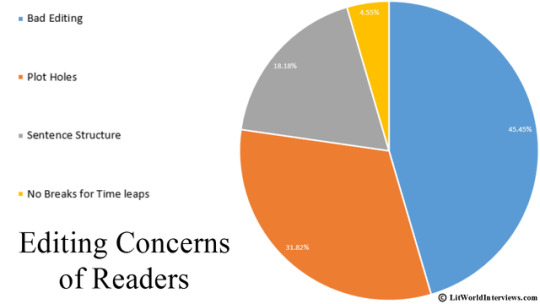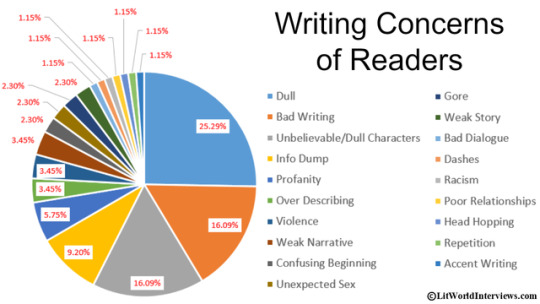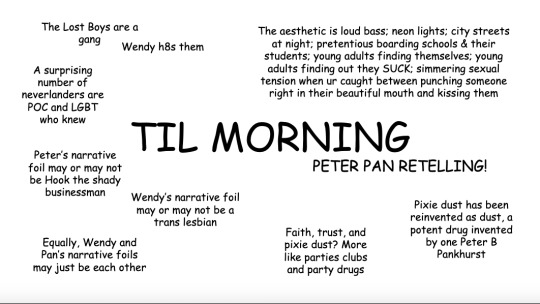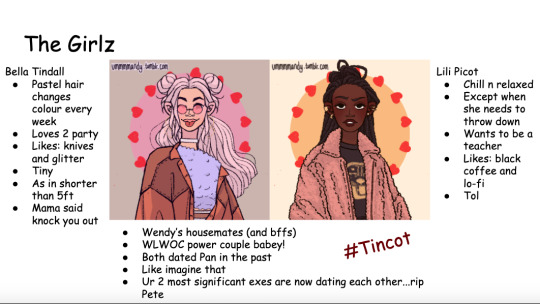Morgan // 18 // INFJ // Aries Constantly re-reading Good Omens. Icon from ummmmandy! Current wip: Lessons in Humanity from a Future Physicist.
Don't wanna be here? Send us removal request.
Text
Writing does not have to be realistic
Writing does not have to be realistic
Writing does not have to be realistic
Oh my god, I’ve seen this so much recently and it’s killing me. Posts that talk about how extreme shows of emotion don’t happen constantly, how fight scenes should never take more than a minute, how nobody notices the exact color of someone’s eyes the first time they meet. And yes, while true irl, you don’t have to write “realistically” if you don’t want to. Not only is expecting this form of realism stifling to a lot of writing styles and genres, but, um, hello we are making art, people! Art! Where exaggeration and aesthetic are at their best and often greatly add to whatever you’re creating.
You want your characters to throw themselves to the ground and sob? To leap and clap their hands from joy and excitement? Do it!!!! Fight scenes that take pages and involve the most ridiculous, outlandish weapons, and have the characters twirl and spin and leap and call out witty banter? Fucking go for it, my guy! You want your character to observe “the gorgeous, ever changing, shifting green hues” of their love interest’s eyes the first time they meet? Hell yeah, baby!
Look, all I’m saying, is that if realism takes away from your writing, if it feels confining and suffocating, then don’t do it! Nothing has to be realistic if you don’t want it to be. Again, we’re talking about art here. Go all out! Be ridiculous and outlandish! Don’t let other’s demand for realism destroy the story you’ve crafted
#realism#lack of realism#writing ref#writing advice#writeblr#have fun with your writing y'all#writing is meant to be fun. fiction is fiction because it isn't real
13K notes
·
View notes
Text
Fiction is disappointing in its portrayal of…people’s weirdness. Just how weird people really are in real life.
So many books have all their characters be incredibly normal and I’m like ????? You guys can go outside and not run into someone who is even slightly strange? Or act like “quirks” are only for characters who are explicitly supposed to be eccentric instead of just…people being people.
like, my neighbor sunbathes in his driveway in his underwear and builds coffins in his spare time. My OTHER neighbor just sets things on fire whenever he needs to relax so at random times he’ll be out burning his deck furniture or something. I knew a guy in high school who woke up every morning at 3am and could lip sync flawlessly to every veggietales song. I knew a girl who collected hand sanitizer and wore bright, glittery green eyesore alligator earrings after she got her ears pierced. our family friend back in Tennessee owns six pugs and an unbridled pug obsession. My brother (13) aspires to be a hobo and calls himself Moped the Cheapskate. My grandma reads ya novels (she loved six of crows btw), determined that she was a ravenclaw through the internet, is responsible for me learning my first curse word, and flips off trump when she’s watching him on TV. one of my high school friends was a conspiracy theorist who did intense research about chemtrails. a member of my squad when I was like 14 was referred to by us only as Poodle. the guy who taught my public speaking class in high school moderated a doomsday prepper forum and would talk wistfully about how he would like a bunker. I used to work out with a guy who worshiped Thor smack dab in the middle of the Bible Belt. today my best friend literally just ate dirt while we were hanging out and I can only be just like “whatever, he eats leaves, the little packets that say do not eat, and food off the floor of restaurants, how could a little dirt hurt him?” because that’s just what he does he just…eats things
The sad thing is that almost everyone I know would be The Weird One if they were part of the cast of a book?? But it isnt weird to be weird or eccentric or the opposite of normal. people are just…that way. books drop any somewhat unusual quality as a marker that a person is “eccentric” and I promise you can’t make your characters too weird
Because I write down people that I meet and hear of: my dad met a lady at his work who claimed to be psychic and talked at length about how ghosts would watch her shower (“I hope you like what you’re seeing!” she would tell them) and about the ghost-seeing party she was planning. He talked to a woman who was a sonographer and who had an enormous tattoo of a dragon all the way up her leg and thigh. “Organs move. Babies don’t,” was her wisdom. He met a guy with a phobia of glitter. People are weird. There’s no excuse to make stock characters and people who are average and without quirks. To me it just makes them seem undeveloped because EVERYONE HAS SOMETHING.
People are just weird. let them be weird pls
#character quirks#character creation#eccentric characters#writeblr#writing ref#people are weird#i love weird characters!!!#i feel like having weird characters is sort of my Thing
23K notes
·
View notes
Note
Any tips for introducing a character?
Avoid the Info Dump: When you introduce a character, do not reveal every detail all at once. Introduce what you have to without disrupting the flow of the story too much and sprinkle the rest of the details in other places.
Avoid Back Story: This is mostly for main characters. Don’t go into the whole back story of a character the second you introduce them. For tips on when to reveal back story, check the back story tag on the tags page.
This is my friend John, he’s really good at math. This is my friend Jane, she’s our student president and I was her campaign manager last year. This is Dan, he’s gay: If introducing a lgbt/mogii/etc. character, don’t fall into this juxtaposition. I’ve unfortunately seen this a few times (though the description of each character do not come right after one another) and it’s a red flag that says “this character is going to be flat/stereotyped”. If you introduce other characters with traits and accomplishments, do the same for gay characters.
Show, Don’t Tell: There are always some things you can tell, but it really helps to use showing to introduce a character. For example, instead of saying that a character is feminine, just describe their appearance, demeanor, and behavior. If a character is a soccer player, show them carrying equipment instead of outright saying they’re a soccer player.
Avoid Multiple Introductions: Don’t introduce several characters at the same time. Focus on one or two at a time and distance introductions so that the reader can remember who is who.
How to Introduce Major Characters
Don’t Stop the Story to Introduce Each Character
4K notes
·
View notes
Text
Basing Your Society on Another
If you’re lost as to where to start with your world building, here are some credible websites that give you a basis to make your own culture. (Just a note, since this is regional, I’m grouping countries that are similar geographically. Also, this list has by no means every country, just some examples, in particular regions of the world) Have fun! (If not a writing tool, this may help if you’re about to travel :D)
North America
Native Americans
Mexico
Canada
United States (South)
United States (North)
United States (West)
Central America
Guatemala
Belize
El Salvador
Honduras
Nicaragua
Costa Rica
Panama
South America
Brazil
Chile
Peru
Colombia
Ecuador
Venezuela
Bolivia
Europe
Portugal
Spain
Scandinavia (Finland, Sweden, Norway, Denmark, Iceland, Greenland)
France
Germany
United Kingdom
Italy
Ukraine
Poland
Czech Republic
Greece
Romania
Africa
South Africa
Egypt
Morocco
Sudan
Madagascar
Somalia
Senegal
Central African Republic
Asia
China
India
Kazakhstan
Thailand
Vietnam
Indonesia
Korea
Japan
The Philippines
Uzbekistan
The Middle East
Saudi Arabia
Iran
Turkey
United Arab Emirates
Iraq
Syria
Israel
Jordan
Oman
Yemen
Bonus Round! Fictional Places
Westeros
Klingon Culture
Middle Earth
The Sovereign (Guardians of the Galaxy Vol 2)
Wonderland (sort of? mostly describes effects on society)
The best part of any world building is mixing and matching different traditions from all around the world to make something entirely creative and new. Good luck building your own!
3K notes
·
View notes
Text
What do you do to get out of a writing slump when it feels like everything you're writing is useless trash and it takes so much energy to write that it doesn't feel good to write at all?
66 notes
·
View notes
Note
How would one write a realistic argument?
How to Write a Realistic Argument

Everyone argues.
Whether it be with a friend, sibling, parent, or coworker—arguments usually break out whenever there’s a stark contrast in opinion over certain things, which can happen a lot.
There are a variety of different kinds of arguments involving a wide range of people with different tempers. Because of this, writing arguments can be a bit difficult, but fear not, for this post is here to help!
1. Know The Writing Style of an Argument

For a very serious argument, the characters probably won’t stop and listen to what their opponent has to say.
It’s quick, choppy, and broken—each character shoving their emotions at one another and trying to get their point across without bothering to understand the other side’s opinions.
There should be a lot of em-dashes and italicized words for emphasis, and if it’s between two people, you want as few speech tags as possible; because there’s going to be a lot of back and forth, speech tags can serve to trip up the flow of the argument rather than help them.
When you do want speech tags or if there are multiple people arguing at once here’s some examples you can use:
Roared
Screamed
Yelled
Bellowed
Barked
Hissed
Shouted
Accused
Interrupted
Growled
Snarled
Spat
Screeched
Shrilled
But you also must know that your characters won’t just be standing stock still and yelling at one another; they’re going to be moving around, so here are some things you can describe your character doing during an argument
Expression contorting
Eyes narrowing
Speaking through clenched teeth
Baring their teeth
Lips twisting (into a sneer/into a snarl)
Hands balling into fists
Trembling
Breaking things/knocking stuff over
Pointing accusingly
Shoving
Spittle flying from their mouth
Stamping their feet
Face getting hot
Vein in forehead popping
Blood roaring in their ears/heart pounding
And if you want, to build tension you can put it in a dangerous place, like at the edge of a cliff or something—so you know fully well that if one of them goes too far it may end up with the other’s accidental death.
Keep reading
7K notes
·
View notes
Text
Finding old music you used to love is like getting back in touch with an old friend.
#me listening to my chemical romance#or fall out boy#or panic! at the disco#ah yes my emo days#also every playlist i made 1-2+ years ago and listen to for the first time since
698K notes
·
View notes
Text
Never Confuse Characterization for Character

Lately I’ve been revisiting Story by Robert McKee, a famous book on the craft of storytelling. It can be pretty intense and heavy at times, so it’s not something I would recommend for beginners. In fact, the first time I read it, a lot of it was so deep and new that it went over my head. It’s been interesting reading it again. Now, parts seem to be validating my ideas, rather than turning and twisting them.
One thing in particular stuck out to me this last week: character vs. characterization.
Regularly, I see writers hyperfocused on characterization.
Characterization is all the surface or near-surface stuff: voice, demeanor, likes and dislikes, hair and eye color, clothes, habits, etc.
Honestly, I personally consider these things to be part of character, but for the sake of this post, we are going to look at them as two different things, to communicate specific ideas.
Characterization can be really important and really effective. Give us the right voice, mannerisms, and appearance, and we can instantly be drawn to someone. Jack Sparrow is a good example. Johnny Depp combined Pepe le Pew with Keith Richards to come up with a unique, iconic characterization. In fact, Depp is often very good with characterization. A lot of actors have the same demeanor for all of their characters (I’m trying so hard to not name anyone in particular right now), but Depp’s Jack Sparrow, Mad Hatter, Willy Wonka, Grindelwald, Mort Rainey, etc. all have unique characterizations.
You are very familiar with characterization. All over online you can find long questionnaires to fill out to get to know your protagonist (or any other character). Back in the day, I would fill these out because they were fun (and they are, and that’s okay!), but I often found that despite how personal the questions could get (i.e. “What is his/her greatest fear?”), I wasn’t quite satisfied with the person on the page, not to mention that a lot of the stuff I ended up brainstorming seemed irrelevant to the story. And in some cases, I had to change what I’d filled out to write a better story “for some reason.”

I’ve actually heard/read a few writers get on the character vs. characterization bandwagon and go on to kind of … knock down characterization. I don’t agree with that. I strongly believe in the power of rich characterization. And I have zero problems if you want to be like Johnny Depp and give each main character a super unique demeanor. In fact, as long as it doesn’t get too outlandish for your world, I enjoy that and think it is a good idea.
After all, if Jack Sparrow had a demeanor like the Mad Hatter, Pirates would be totally different.
But here is the problem that past me, and I see a lot of writers run into, characterization is not the sum of character. You might be filling out questionnaire after questionnaire, trying to find The Thing™️, but it’s not coming together, because you only know about characterization.
Characterization is part of a character, but it isn’t fully “character.” When it gets down to it, when you want to get really, really deep, characterization isn’t going to get you there.
As J.K. Rowling famously wrote, it’s our choices that determine who we are.
You can be the gothiest goth kid, or the preppiest prep kid, but who you truly are is what you choose to do, and perhaps, I would probably add, why you choose to do it. When encountering a stray dog, do you kick it away or give it some food? You can cut out all the external stuff; you can cut out the hairstyle, the age, the clothes, the likes and dislikes, and at the heart of it, is choices.
But it’s not just any choice.
As Robert McKee and others have stated, to get into that inner gem of character, it’s the choices the character makes when there are significant stakes. If a character chooses vanilla ice cream over chocolate, that doesn’t really tell me a lot, unless I want to read symbolism into it (which could be there).
Maybe your protagonist tells the truth to his parents about putting a frog in his sister’s bed. Does that really matter if there are no potential consequences involved? Telling the truth when there are no dire consequences is easy. Telling the truth when there are important things at stake is harder. What if telling the truth meant he would be grounded and could not participate in a talent show he’s been practicing for, for months? There is prize money involved, and he was hoping to use that money to buy a chemistry set. Chemistry is his passion and he wants be a world-renowned chemist someday. Which is more important to him? A potential chemistry set or telling the truth?
This can be a great way to add depth. Well, it is depth. Especially if their characterization seems to be at odds with who they truly are. A vampire who craves human blood but chooses not to drink it is interesting. A prince who’d rather be a beach bum is interesting. The bully who, when it gets down to it, sticks up for an enemy is interesting. It makes them more complex. It draws us in so we want to know more. Why doesn’t this vampire drink human blood? Why doesn’t this prince want to be a king? Why did this bully stick up for someone? The answers to those questions makes them complex.
We all have layers after all. And we all have boundaries. I almost never lie. But if I was stuck between telling the truth or lying to save a loved one’s life, well, I’d pick the latter. But if I picked the former, that would say a lot about me as well.
Some writers throw in contradictions to create character depth (a vampire who refuses to drink human blood), which works, but if it’s a main character, and I never get an idea or hint of the “why,” I sometimes find myself feeling … cheated. Like it was just thrown in (and maybe it was). I also then get stuck, fixated on the why that I never get, so it’s distracting. I don’t know that we always need to explore the why, but I would say for main characters, it’s almost always more effective, more powerful, more meaningful, to address the why, to some extent. Unless, of course, the reason is ridiculous, in which case, maybe you need to reevaluate that and come up with something better.
There is an important part to all of this, which is that we need to see your character making significant choices, which means they must be placed in situations where they can make decisions. If you don’t give your character opportunities to make significant decisions, it’s probably going to be a problem. This is another reason why people ask for “active” protagonists. They must want something and make choices with stakes attached.
Don’t be afraid to make your protagonist’s true self a bit negative or flawed–after all, they need to grow during the story (usually). Maybe near the beginning of the story, you show your character being selfish, but at the end, we see he is willing to sacrifice his life, literally or figuratively. This is called character arc.
The way your character changes through the course of the story can also bring more “character” to him or her than characterization can alone. If we have a character that starts as a villain, but ends up being a good guy by the end, well, that’s interesting and complex, and the transformation demands depth to be satisfying. This can all get more complicated real fast, because there are degrees and variations, and I don’t want to muddy the water quite yet.
But if you are only trying to find character by filling out endless characterization questionnaires, you might never write a fully formed, deep, complex character. Instead, consider choices, contradictions, and arcs.
1K notes
·
View notes
Text
some REAL writing advice
i posted this list a few years ago but i thought i’d repost it with a couple edits, since it’s all still perfectly good and plenty of people could do to see it. it works no differently for fanfic and original works.
For the most part, just don’t listen to anything your English teachers say unless they’re like, a published author. You know that shit about how “you shouldn’t use the same word to start a sentence more than once in 4 consecutive sentences” - yeah, that’s bullshit. As long as you don’t REALLY over-use something, you’re fine. Good flow in a story isn’t even necessarily consistent with proper grammar.
That being said, be well-versed in proper grammar. Yeah, there’s always artistic liberty, but there are times when you do absolutely need to structure a sentence a certain way. Such as “would have” (correct) vs. “would of” (you’ll look like an idiot if you write that). Know participles and all the different tenses and how to use them correctly, know passive and active voice, etc.
Keep expanding your vocabulary. Contrary to what your English teachers say, using “said” a lot isn’t that bad, but using other words sometimes keeps it from getting monotonous. Keep learning new idioms and phrases. Know when to use the words and how to use them. Example: “for all intensive purposes” isn’t a thing - it’s for all intents and purposes. Know the connotations that certain words have.
Know your voice. Even if you’re writing in 3rd person, you’re probably still writing from the POV of a particular character - write as though you’re in that character’s head! Keep to a vocabulary level that that character likely has. Vaguely switch over to first person occasionally. Teachers often say not to write how you speak, but if you’re writing limited from a person who wouldn’t speak like a scholar all the time, write how they would speak. If you’re writing omniscient, you’re hopping from person to person and you can still do that.
Know how people work. Observe people, keep track of your own emotions, actually think about how different people would react in a certain situation. Make people stutter a little bit in their dialogue or not say precisely what they mean - most people don’t talk like a textbook. Put in thought processes and body movements in between dialogue. A sentence like “He blinked.” is perfectly acceptable in some contexts and could mean a lot.
Know how the world works. If you’ve never had a job before, research what getting a job is like before you write about it. If you’ve never had anal sex before, dear god please fucking research it. Make your story realistic and keep the “altering real-life events for the sake of a more entertaining story” to a minimum. And if you’re writing fantasy, do some worldbuilding.
And that being said, know what’s entertaining. Know what keeps your readers hooked. You don’t have to write out every single class a character goes to and all their homework and whatnot if it’s not relevant to the plot or characterization. You can just mention that they had a long day at school. Do time lapses, it’s okay. You don’t even have to give a summary of the things that happened during the time lapse because that makes it seem like you think your readers are stupid. Give them credit and don’t explicitly state everything.
Really just a follow-up, but DON’T write day-to-day. Unless it’s specifically a day-to-day fic or something that takes place in a very short amount of time. Chances are not every day has something interesting or relevant to the plot going on.
Write more about thoughts and actions than dialogue. Knowing how a character is feeling about something and how they express it is can be much more telling than what they’re saying. But it’s also good to have a healthy mix of thoughts, direct dialogue, and hearsay.
Know how to structure your writing, mainly for accessibility. Don’t make paragraphs that are too long and don’t only make one-sentence paragraphs. Start a new paragraph when someone starts talking. Don’t confuse your readers.
Read. Read a lot. Get a good grip on how the most successful writers of our age write. Read unpublished writers, too. That isn’t to say that you should copy them - just take some pointers from them. No one writes well without ever reading a fuckload. Develop a writing style that you’re comfortable with. Some people are more descriptive than others, and that’s okay. Some people rely more on dialogue to tell a story, and that’s also okay.
Write. Just keep writing. Like anything else, the more you do it, the better you get. Write things you like to write about and get feedback. Even Shakespeare probably started out with some pretty shitty stuff, so it’s okay if you’re a little rusty right now. You will get better with practice.
5K notes
·
View notes
Text
the entire concept of dark academia is so funny to me
imagine u go to college and immediately upon finding a group of friends u just go feral and commit homicide,,, oh whats that? homer made u do it? shakespeare’s ghost said do it or else ur homophobic? voltaire’s spirit held you at gunpoint?? fitzgerald and his bro hemingway sent you prophetic visions once upon a midnight dreary?
#tropes i can't get enough of#dark academia#god that's me#if i don't write a dark academic book one of y'all's gonna have to kill me
3K notes
·
View notes
Text
Hey real quick who gave me permission to put “Not talkin’ ‘bout your dick costs $0″ and “The universe does not bend around them; the universe does not care about them” in the same paragraph? Who let me do this?
#morgan speaks#seriously who allowed me to do this#you're not allowed to talk about dicks and then the universe in one paragraph right??
3 notes
·
View notes
Text
The worst part about working on original fiction is u gotta wait like 5 years to get a book draft done in order to SHOW YOUR FRIENDS chapters. Ain't like fanfic where you can just....send em. Tis horrid.
42K notes
·
View notes
Text
Winter Doesn't Equal Dead and Dormant
I’ve seen a few things talking about how fall and winter are the time when life-driven beings/characters would struggle because everything dies and/or goes dormant. But that’s not true!
Plants that remain active during winter:
Spruce trees (and other evergreens)
Wintergreen boxwood
Sweet box
Mock rush
Holly
Plants that bloom during the winter:
Winterberries
Snowdrops
Witchhazel
Camellia
Christmas rose
Animals that remain active during the winter:
Arctic fox
Shrews and deer mice
Caribou
Lynx
Polar bear
Snow leopard
Penguins
North American river otter
Chickadee
Animals that give birth during the winter:
Bears
Squirrels
Badgers
Instead of portraying fall and winter as the time when our nature-based characters became lethargic, depressed, and/or distant, why don’t we show them being playful and incapable of sitting still? Or constantly baking, eating, and socializing. They could be extra flirty/frisky. They could be loud and jovial. Maybe they wear bright splashes of colour (like red, green, bright orange) to ‘pop’ against the snow. Maybe they get bit by the travel bug. There are lots of different ways for nature-based characters to behave!
Just something to keep in mind ^.^
5K notes
·
View notes
Text
you know what i don’t see enough in books and media in general?
stuttering.
and no, i don’t mean the n-nervous b-b-b-blushing st-stuttering, i mean actual, clinical stuttering. stuttering that doesn’t just appear when you’re doing a presentation or talking to someone you like. stuttering that shows up in everyday conversation.
i’ve had a stutter for as long as i can remember, and even though it’s something that seems so minuscule, it really isn’t. i got bullied because of it. bullied. can you imagine that? people still make fun of me for it to this day, and i think that it was a factor in my severe social anxiety and stage fright. seriously, it’s hard.
so i want to see a story that includes a character who stutters, even a minor one. it might get a little annoying, but it doesn’t even have to be that big! just the occasional slip-up, a nervous tic. it would make a lot of people feel better.
and if their character arcs surround their stutter? even better! it shows that we can learn to overcome our stutter, and that we shouldn’t let it hinder us from doing the things we want.
TL;DR, stuttering and similar verbal and physical tics are severely underrepresented in media.
(if anyone has any questions about stuttering at all, please don’t hesitate to ask! i would love to talk about it!)
2K notes
·
View notes
Photo




Why readers stop reading.
I found this on a literary agency blog. If you’re struggling with writing/revision, this breakdown could help you out.
2K notes
·
View notes
Text
Honestly one of my favorite tropes is a couple that judges people together. That is the mark of a power couple.
#tropes i can't get enough of#cough cough ninerose#and harknine i guess#i'm not active enough in doctor who shipping to know the ship name for nine & jack harkness#oh and also murder husbands
3 notes
·
View notes
Photo







A COMIC SANS PRESENTATION. | TIL MORNING.
#til morning#others' writing#oh this. this is literally so amazing#i love this#i would love to be added to the taglist!!!#this sounds so cool and i am Fascinated Already#i would definitely die for all these characters not gonna lie
108 notes
·
View notes